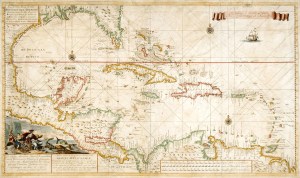 For early Americanists, the past two decades have seen an increase in scholarship connecting the early modern Caribbean to colonial North America. The Caribbean adds significant depth and dimension to discussions of race, slavery, diplomacy, capitalism, gender, and imperial competition by expanding the historiographies and archival resources common to early American scholarship. Yet, when a colleague stopped by my office asking for readings on seventeenth-century Puerto Rico to assign for a class, I drew a blank. Despite the excellent scholarship on colonial Puerto Rico written in Spanish, English-language scholarship focuses primarily on the nineteenth and twentieth centuries.[1]
For early Americanists, the past two decades have seen an increase in scholarship connecting the early modern Caribbean to colonial North America. The Caribbean adds significant depth and dimension to discussions of race, slavery, diplomacy, capitalism, gender, and imperial competition by expanding the historiographies and archival resources common to early American scholarship. Yet, when a colleague stopped by my office asking for readings on seventeenth-century Puerto Rico to assign for a class, I drew a blank. Despite the excellent scholarship on colonial Puerto Rico written in Spanish, English-language scholarship focuses primarily on the nineteenth and twentieth centuries.[1]
What made this worse was that last Thursday was the one-year anniversary of Hurricane Maria’s landfall in Puerto Rico. And, while the devastation and continued struggles on the island garner on-going media attention, the anniversary set me thinking about the place of the Caribbean in our scholarship and our teaching. It seems that, despite increased attention to the Caribbean within the field of vast early America, not all Caribbeans are created equal. And that unevenness demands our attention. Continue reading


 Earlier this month, the American Historical Association
Earlier this month, the American Historical Association 
 Three days ago, the Washington Post
Three days ago, the Washington Post